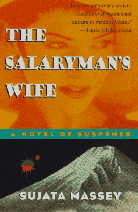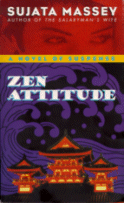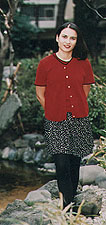A Conversation With Sujata Massey
by Claire E. White
Sujata Massey was born in 1964 in Sussex, England to a father from India and a mother from Germany. Her name is taken from Buddhist history -- Sujata was the young woman who served Buddha a bowl of rice or milk.

|
How did you get your start as a journalist?
I was a creative writing major in college, and I did an internship my senior year at the Baltimore Evening Sun newspaper. Immediately after graduation I was hired as a features reporter, and while doing that for five years, I wrote about food, fashion, personalities, and other topics.
What did you enjoy most about your years at the Baltimore Evening Sun?
The camaraderie with other young writers of many different backgrounds! After that, the thrill of meeting deadlines and seeing one's writing in the paper eight hours after completion.
How has your journalistic background influenced your writing style?
When I first started writing fiction from a narrator's point of view, I was afraid to insert opinion, because I had been trained to stay away from that as a journalist. That was a definite problem. On the other hand, I had the advantage of being accustomed to editing. I listen openly when people are critical of my work, and I use their comments to improve it.
What struck you most about Japan when you first moved there in 1991?
I was thrilled by the way traditional living patterns have not changed. Many families still bathe at night communally, sleep on futons, buy tofu from a neighborhood shop, and live without central heating. Well, the last point was something I wasn't so thrilled about because I had to live in a traditional house.
What did you love most about living in Japan?
People are in touch with the seasons and each other in a way I've never seen. Also, the courtesy that is the standard for daily behavior makes life much more pleasant for everyone. We Americans could take a lesson from the Japanese.
I know you visit Japan regularly. What is your idea of a perfect day spent there? (What city, where do you go, what do you have for lunch etc.)
Wake up at eight at Asia Centre in southwest Tokyo's Akasaka district, having successfully slept through the night. Jog to Omote-Sando, a beautiful street that is Tokyo's Champs-Elysee, and breakfast on croissants and coffee for less than $4 at the Appetito sandwich shop. After showering back at Asia Centre, dress for an interview and lunch with my friend at the National Police Agency. Afternoon is spent shopping for antiques or studying them in museums. Happy Hour and/or dinner in a Roppongi bar with an antique dealer friend. Walk home safely at 11 while watching the tame street life.
When did you first know you wanted to be a novelist?
I have always enjoyed writing fiction, however I thought the occupation would come to me when I was in my fifties. In my late 20s, however, I was in Japan and very underemployed, so I decided it would be a good chance to at least get some practice.
How did The Salaryman's Wife come to be published?
 Click here for ordering information. |
What was your inspiration for Rei Shimura?
There is no person who specifically inspired the character. I was interested in writing about a young woman who belonged to two cultures, so she came to me. I myself have four cultures--parents from India and Germany, and I was born in England and grew up primariliy in the US.
Let's talk about your second book starring Rei Shimura - Zen Attitude. How did you come up with the idea for Rei's second adventure?
I wanted to explore the world of Japanese antiques without having to buy them! And the book is set in a lovely town full of Zen temples called Kamakura that was five minutes away from Hayama, the town where I lived while in Japan. When writing a book, I start with the setting and the Japanese cultural art that I would like to learn more about--and I take it from there. The murder and motive come later.
In Zen Attitude, Rei must face some challenges in her relationship with Hugh. How did you go about integrating the relationship elements of the plot with the mystery elements? Was it difficult to do?
 Click here for ordering information. |
What is the most challenging aspect of writing the Rei Shimura series?
The fact that I am writing a series based in Japan, and I don't live there anymore. I deal with the conflict by visiting there frequently.
How much of you is in the character of Rei?
I think that we both share a deep desire to incorporate ourselves totally in the foreign countries where we have lived, rather than living as isolated, privileged foreigners. Aside from that, I think Rei is more impulsive and risk-taking than I.
Rei is an expert on antiques. Do you share her love for them?
Very much so. I write about antiques because I can't afford to buy many of them. I've had some funny experiences too where I wrote a scene where Rei bought an antique that turned out to be fraudulent, and then gone out and also bought a rip-off myself.
The books feature some mouth-watering Japanese cuisine. How did you get interested in Japanese cuisine? What other kinds of food do you enjoy cooking?
I studied cooking for two years while living in Japan. I'm particularly interested in vegetarian dishes from Japan and other parts of Asia. Indian and Mediterranean cooking is the bulk of what I prepare at home.
What's next for Rei Shimura?
In May 1999, a mystery featuring Rei called The Flower Master will take her into the cut-throat world of flower arranging. In 2000, another book will appear, but I'm still working on it.
How much do you use the Internet when you are researching a book?
Not very much, however I did discover some interesting environmental information that I am working in the new book.
What is the most surprising thing that has happened to you since your first novel was published?
| "Do not worry about getting published until you have completely written and revised your book, shown it to five friends that you trust, and taken their comments into consideration for your rewrite." |
How do you approach plotting? Do you use outlines?
I write a very brief outline to sell the book to HarperCollins, and then I write it from start to finish. When I have ideas, I toss them into a file on the computer just for ideas about that book--sort of like a book journal. I got the idea from a talk that Sue Grafton gave about how she keeps track of her ideas for each book.
What do you like to read?
Lots of contemporary mysteries; literary novels by Indian and Japanese and English authors; the DorothyL mystery readers' list serve!
 What is most likely to distract you if you are writing?
What is most likely to distract you if you are writing?
Email and my cat!
What is your advice to aspiring mystery writers?
Do not worry about getting published until you have completely written and revised your book, shown it to five friends that you trust, and taken their comments into consideration for your rewrite. I rewrote my first book more than 50 times before I showed it to an agent. There is something to be said for not proceeding until you are as polished as you can be.
More from Writers Write
Stephen King Quotes
quotes from the master
quotes from the master
Grammar Tips
improve your writing
improve your writing
Writing Prompts
spark your creativity
spark your creativity
